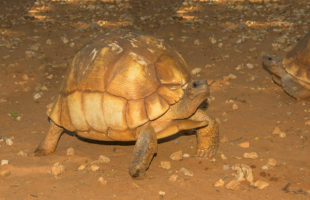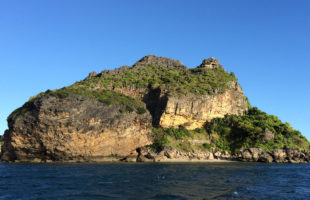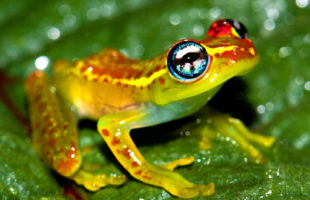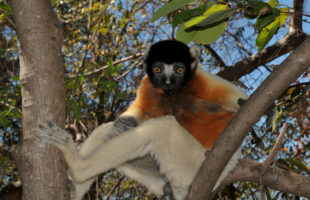Tortoises are popular, both in Madagascar and all over the world. And yet these reptiles on the red island are massively threatened. One of them is the Spider Tortoise (Pyxis arachnoides), named after the beautiful, web-like pattern of its dorsal shell. The older Spider Tortoises get, however, the more the pretty pattern disappears. Really old animals – it is assumed …
LesenSchlagwort-Archiv: rare animals Madagascar
Amber mountain national park
Amber Mountain: The name comes from the flowers of certain trees that cover the mountain and shine amber from afar. Location: The Amber Mountain National Park is located in northwestern Madagascar in the Diana region. The nearest major city is Antsiranana (Diego Suarez) on the coast, about 30 km away. From the capital Antananarivo, the park is located about 1000 …
LesenThe real treasures of Madagascar
An arched, golden shell, relatively long legs and alert, black, shining eyes: That is how the most precious tortoise on Earth looks like. It comes from Madagascar and is named ploughshare tortoise (Astrochelys yniphora) due to the large bony appendage on its breast shell. It serves males to turn over contrahents or females during mating season. And this is quite …
LesenNosy Hara national park
Nosy Hara: The name means “mountainous island” (hara comes from the Malagasy harana = mountains), which goes back to the characteristic needle stone rock formations. The island belongs to a small archipelago of twelve uninhabited islands surrounded by coral reefs. Location: The island of Nosy Hara is located in northern Madagascar in the Baie de Courrier, which belongs to the …
LesenDie singenden Lemuren: Indris
Ihre Gesänge gehören zu den eindruckvollsten, die die Tierwelt zu bieten hat: Man kann die Stimmen der Indris (Indri indri) kilometerweit durch den Wald schallen hören, und sie tragen eine eigentümliche Traurigkeit mit sich. Angeführt und begonnen wird der Gesang stets vom Elternpaar einer Familie, das damit sein Revier absteckt, aber auch mit anderen Familien kommuniziert und vor Bedrohungen wie …
LesenThe second smallest reptile on Earth
It can sit on a matchstick without a problem, and you could almost think that the slightest breeze will blow the fragile pipsqueak off the match: Brookesia micra, the second smallest* reptile on Earth. Despite its few millimeters body lengths, the little, brown leaf chameleon has everything other chameleons need for life, too: Eyes moving to every possible direction, a …
LesenMitsinjo reserve
Mitsinjo: Mitsinjo means as much as “looking ahead” or “planning the future”. Location: The reserve is located close to the village Andasibe in eastern Madagascar, around 140 km away from the capital Antananarivo, in the region Alaotra-Mangoro. You drive approximately four hours on RN2, which is not in the best condition, and then change direction at a well-signed junction. Information …
LesenThe angels of the forest: Silky sifakas
The Silky Sifaka (Propithecus candidus) is one of the most beautiful and special lemurs of Madagascar, but also one of the rarest. There are only about 250 sexually mature silk sifakas left in Madagascar, otherwise they do not occur anywhere else in the world. For comparison: In Asia alone there are still around 3000 to 5000 full-grown specimens of tigers …
LesenSecret kings of the North: Golden crowned sifakas
In an incredibly hot, dry and inaccessible area in north-eastern Madagascar live white lemurs, which owe their name to the golden fur on their heads: the Golden Crowned Sifakas (Propithecus tattersalli). The secret kings of the north reach a height of just 95 cm with a weight of 3.5 kg, whereby still further 45 cm of tail come in addition. …
LesenWidely spread, hardly researched: Crowned Sifakas
In the northwest of Madagascar live lemurs, which occur quite frequently, but are nevertheless hardly researched: The Crowned Sifakas (Propithecus coronatus). Their habitat is limited by the two rivers Mahavavy in the southwest and Betsiboka in the northeast. Today, however, there are indications that the species is much more widespread and also populates areas around Tsiroanomandidy, Amboloando (south of Miandrivazo) …
Lesen MADAMAGAZINE Your Magazine about Madagascar
MADAMAGAZINE Your Magazine about Madagascar










